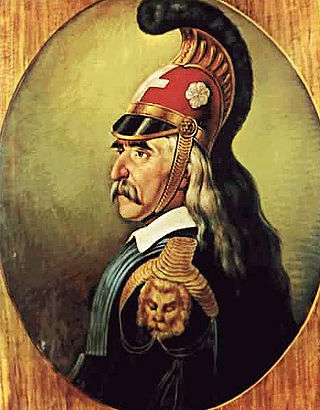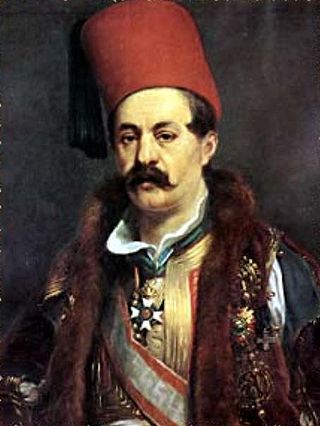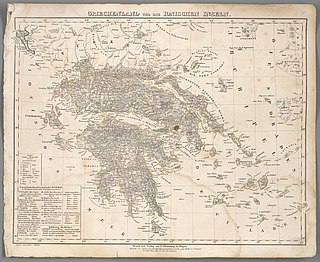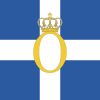The history of modern Greece covers the history of Greece from the recognition by the Great Powers — Britain, France and Russia — of its independence from the Ottoman Empire in 1828 to the present day.

Otto was King of Greece from the establishment of the Kingdom of Greece on 27 May 1832, under the Convention of London, until he was deposed in October 1862.

The Greek War of Independence, also known as the Greek Revolution or the Greek Revolution of 1821, was a successful war of independence by Greek revolutionaries against the Ottoman Empire between 1821 and 1829. In 1826, the Greeks were assisted by the British Empire, Kingdom of France, and the Russian Empire, while the Ottomans were aided by their vassals, especially by the Eyalet of Egypt. The war led to the formation of modern Greece, which would be expanded to its modern size in later years. The revolution is celebrated by Greeks around the world as independence day on 25 March.

Andreas Vokos, better known by his nickname Miaoulis, was a Greek revolutionary, admiral, and politician who commanded Greek naval forces during the Greek War of Independence (1821–1829).

Theodoros Kolokotronis was a Greek general and the pre-eminent leader of the Greek War of Independence (1821–1829) against the Ottoman Empire.

Ioannis Kolettis was a Greek politician who played a significant role in Greek affairs from the Greek War of Independence through the early years of the Greek Kingdom, including as Minister to France and serving twice as Prime Minister. Kolettis is credited with conceiving the Byzantine restorationist and irredentist Megali Idea or "Great Idea" which became the core of Greek foreign policy until the early 20th century.

Andreas Metaxas was a Greek politician, fighter of the Greek War of Independence and diplomat from Cephalonia. He was prime minister of Greece from 3 September 1843 to 16 February 1844. Some military leaders of the revolution (Makriyannis) gave him the ironic nickname of "Conte Lalas'" due to his injury during the Battle of Lalas.
The London Conference of 1832 was an international conference convened to establish a stable government in Greece. Negotiations among the three Great Powers resulted in the establishment of the Kingdom of Greece under a Bavarian prince. The decisions were ratified in the Treaty of Constantinople later that year. The treaty followed the Akkerman Convention which had previously recognized another territorial change in the Balkans, the suzerainty of the Principality of Serbia.

Athanasios Miaoulis was a Greek military officer and Prime Minister of Greece. Born in Hydra in 1815, Miaoulis was the son of the famous Greek admiral Andreas Miaoulis, from whom he learned his navigation skills.
The Russian Party, presenting itself as the Napist Party, one of the early Greek parties, was an informal grouping of Greek political leaders that formed during the brief period of the First Hellenic Republic (1828–1831) and lasted through the reign of King Otto. The parties of that era were named after one of the three Great Powers who had together settled the Greek War of Independence in the Treaty of Constantinople (1832). The three rival powers, the Russian Empire, the United Kingdom and July Monarchy France came together in order to check the power of the other two nations.
The French Party, presenting itself as the Constitutional Party, was one of the three informal early Greek parties that dominated the early political history of Modern Greece, the other two being the Russian and the English Party.
Parliamentary elections were held in Greece between June and August 1844. Supporters of Andreas Metaxas emerged as the largest block in Parliament. However, Ioannis Kolettis became Prime Minister on 18 August.

The London Protocol of 1830, also known as the Protocol of Independence in Greek historiography, was a treaty signed between France, Russia, and Great Britain on 3 February 1830. It was the first official international diplomatic act that recognized Greece as a fully sovereign and independent state, separate from the Ottoman Empire. The protocol afforded Greece the political, administrative, and commercial rights of an independent state, and defined the northern border of Greece from the mouth of the Achelous or Aspropotamos river to the mouth of the Spercheios river. As a result of the Greek War of Independence, which had broken out in 1821, the autonomy of Greece in one form or another had been recognized already since 1826, and a provisional Greek government under Governor Ioannis Kapodistrias existed, but the conditions of the Greek autonomy, its political status, and the borders of the new Greek state, were being debated between the Great Powers, the Greeks, and the Ottoman government.

Panoutsos Notaras was a Greek revolutionary and politician who was a leading figure of the Greek War of Independence, serving several times as president of the Greek national assemblies and legislative bodies.
A new legislative body called the Senate was created in 1829 by the Fourth National Assembly at Argos, replacing the prior advisory body called the Panellinion which had been founded by Governor Ioannis Kapodistrias the previous year.
A number of different and competing administrations used the name Administrative Committee(Greek: Διοικητική Επιτροπή) throughout 1832, each claiming responsibility for a different part of Greece, all after the dissolution of the Administrative Committee of 1831 of Augustinos Kapodistrias, Theodoros Kolokotronis, and Ioannis Kolettis and before the installation of King Otto of Greece.

A regency council ruled the Kingdom of Greece in 1833–1835, during the minority of King Otto. The council was appointed by Otto's father, King Ludwig I of Bavaria, and comprised three men: Josef Ludwig von Armansperg, Georg Ludwig von Maurer, and Carl Wilhelm von Heideck. The first period of the regency saw major reforms in administration, including the establishment of an autocephalous Church of Greece. The regency's authoritarianism and distrust of the Greek political parties, especially the Russian Party, which was associated with the period of Governor Ioannis Kapodistrias and was particularly opposed to the Church reforms, led to a quick eroding of its popularity. Armansperg was the council's chairman, but increasingly clashed with the other two regents, who in turn aligned with the French Party under Ioannis Kolettis. The main domestic event of the early period was the arrest and sham trial of Theodoros Kolokotronis, a hero of the Greek War of Independence and the de facto leader of the Russian Party, in 1834. This rallied the opposition against the regency, helped provoke a major uprising in the Mani Peninsula, and fatally undermined the prestige of Maurer and Heideck versus Armansperg. The conflict was resolved in Armansperg's favour in July 1834, when Maurer was replaced by Egid von Kobell. Following Otto's coming of age in June 1835, the council was dissolved, but Armansperg remained in charge of the government as Prime Minister.
Philorthodox Society was a secret political and revolutionary organization. Established in June 1839, it aimed to strengthen the position of the Eastern Orthodox Church within the Kingdom of Greece and expand its borders. The organization was directly associated with the Russian Party.

The election to the throne of Greece in 1822–1832, which began soon after the start of the Greek War of Independence against the Ottoman Empire (1821–1830) and concluded two years after the international recognition of the country's independence, was a pivotal moment in Greek history. The conflict was significantly shaped by the involvement of major European powers, namely the United Kingdom, Russia, and France, in the struggle between Greek patriots and their former Ottoman rulers.











